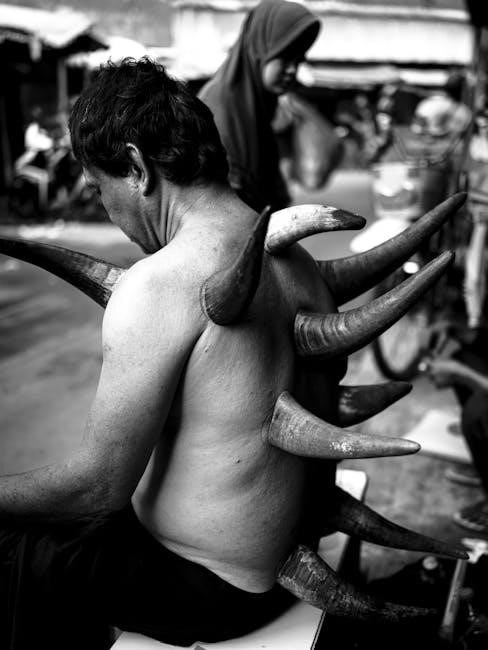theology of the body pdf
Pope John Paul II’s Theology of the Body‚ delivered in 129 catechetical addresses‚ explores human dignity‚ sexuality‚ and spirituality through a biblical lens‚ emphasizing the body’s role in understanding God’s plan․
1․1 Overview of the Theology of the Body
Theology of the Body‚ a groundbreaking series of 129 catechetical addresses by Pope John Paul II‚ explores the deeper meaning of human sexuality‚ dignity‚ and spirituality․ It reveals how the human body‚ as a divine gift‚ reflects God’s love and plan․ By examining biblical teachings‚ the addresses emphasize the sacredness of the body and its role in expressing love‚ commitment‚ and union․ The Theology of the Body highlights the nuptial meaning of the body‚ pointing to the ultimate union between God and humanity․ It also underscores the unity of body and soul‚ showing how both dimensions of human existence are intertwined․ This theology serves as both a reflection on human nature and a guide for living a life of virtue‚ love‚ and fulfillment․ Its insights continue to inspire spiritual growth and a deeper understanding of God’s plan for humanity․
1․2 Historical Context and Development
The Theology of the Body‚ rooted in Pope John Paul II’s 129 catechetical addresses from 1979 to 1984‚ emerged as a response to modern societal challenges regarding human sexuality and dignity․ These teachings were revolutionary‚ offering a fresh perspective on the body’s sacredness and its role in expressing love and union․ Drawing from biblical sources‚ such as Genesis and the Gospels‚ John Paul II emphasized the nuptial meaning of the body‚ linking it to God’s divine plan․ The development of this theology was influenced by earlier Catholic teachings‚ including those of Augustine and Thomas Aquinas‚ while also addressing contemporary issues like contraception and the dignity of human life․ By integrating theology‚ anthropology‚ and Scripture‚ the Theology of the Body provides a comprehensive understanding of human nature‚ bridging the gap between faith and everyday life․ Its historical significance lies in its ability to address timeless truths in a modern context‚ offering a profound vision of human sexuality and spirituality․

Key Themes and Principles
The Theology of the Body emphasizes the dignity of the human body and its nuptial meaning‚ highlighting the unity of body and soul and the gift of self in love‚ reflecting God’s divine plan․

2․1 The Dignity of the Human Body
The dignity of the human body is a central theme in the Theology of the Body‚ rooted in the belief that the body is a sacred gift from God․ John Paul II emphasizes that the human body is not merely a biological entity but a reflection of God’s divine plan․ This dignity is inherent in every person‚ regardless of gender‚ age‚ or physical condition․ The body is seen as a temple of the Holy Spirit‚ entrusted to humans as stewards․ This teaching underscores the moral responsibility to respect and care for the body‚ as it is a vital part of human identity․ The dignity of the body is also closely tied to its purpose in expressing love and life‚ highlighting the interconnectedness of the body’s physical and spiritual dimensions․ This principle serves as the foundation for understanding human sexuality‚ morality‚ and the body’s ultimate destiny in eternal life․
2․2 The Nuptial Meaning of the Body
The nuptial meaning of the body‚ a key concept in the Theology of the Body‚ reveals the body’s inherent vocation to love and union․ John Paul II draws from Scripture‚ particularly the Genesis account‚ to illustrate that the human body is created for self-giving and communion․ The body’s masculinity and femininity are seen as complementary‚ designed for the mutual gift of love in marriage․ This nuptial dimension is not limited to the sexual act but encompasses the entire person‚ expressing the deep longing for union that mirrors God’s love․ The spousal analogy extends to the relationship between Christ and the Church‚ highlighting the sacrificial and fruitful nature of love․ This understanding profound implications for marriage‚ sexuality‚ and spirituality‚ emphasizing that human love is a reflection of divine love and an invitation to participate in God’s creative and redemptive plan․
2․3 The Unity of Body and Soul
The Theology of the Body emphasizes the profound unity of the human body and soul‚ rejecting dualistic views that separate the two․ John Paul II teaches that the body is not merely a physical shell but an integral part of the person‚ expressing the soul’s spiritual and emotional dimensions․ This unity is rooted in the biblical account of creation‚ where God forms man from the earth and breathes life into him‚ making him a living soul (Gen 2:7)․ The body‚ as a “theology of the body‚” reveals God’s plan for humanity and the sanctity of human life․ This understanding challenges modern tendencies to reduce the body to mere biology or sexuality‚ instead highlighting its role in expressing love‚ spirituality‚ and the divine image․ The unity of body and soul is central to the Theology of the Body‚ affirming the holistic nature of human dignity and the interconnectedness of physical and spiritual dimensions․
2․4 The Gift of Self: Unitive and Procreative Dimensions
The Theology of the Body highlights the dual dimensions of human sexuality: the unitive and the procreative․ The unitive dimension emphasizes the deep union and mutual love between spouses‚ reflecting God’s love and commitment․ The procreative dimension underscores the potential for new life‚ mirroring God’s creative power․ Together‚ these dimensions reveal the body’s role in expressing love and life‚ central to God’s plan․ John Paul II teaches that true intimacy involves a total gift of self‚ body and soul‚ in a communion of persons; This perspective challenges contraceptive ideologies‚ promoting openness to life as an essential aspect of marital love․ By understanding these dimensions‚ individuals can embrace the beauty and purpose of human sexuality‚ fostering deeper relationships and living out their vocation to love authentically․

Theological Foundations
The Theology of the Body is rooted in Scripture‚ particularly Christ’s teachings‚ emphasizing the unity of body and soul․ It integrates biblical anthropology with Catholic doctrine‚ exploring human dignity and God’s plan․
3․1 Biblical Basis for the Theology of the Body
The Theology of the Body is deeply grounded in Scripture‚ particularly in the Book of Genesis and the teachings of Jesus․ Pope John Paul II emphasizes the creation accounts in Genesis‚ where human beings are made in the image and likeness of God‚ highlighting the intrinsic dignity of both male and female․ The biblical account of marriage in Genesis 2:24 is central‚ illustrating the nuptial meaning of the body and the unity of spouses․ Additionally‚ Christ’s teachings on marriage and the body‚ as recorded in the Gospels‚ provide a theological foundation for understanding human sexuality and love․ The resurrection narratives also underscore the redemption and ultimate glorification of the body‚ reinforcing its sacredness․ This biblical framework serves as the cornerstone for the Theology of the Body‚ linking human existence to God’s divine plan․
3․2 The Influence of Theological Anthropology
Theological anthropology significantly shapes the Theology of the Body by exploring the nature and dignity of the human person․ This discipline examines humanity as created in God’s image‚ emphasizing the unity of body and soul․ It highlights the relational aspect of human beings‚ called to love and communion‚ reflecting God’s own Trinitarian nature․ Theological anthropology underscores the intrinsic value of the body‚ not merely as a biological entity but as a vital expression of the person․ This understanding informs the Theology of the Body’s emphasis on human dignity‚ the nuptial meaning of the body‚ and the integration of sexuality within the divine plan․ By grounding human existence in a theological framework‚ it provides a holistic view of the person‚ integrating faith‚ reason‚ and lived experience․ This anthropological foundation enables a deeper appreciation of the body’s role in expressing love and fulfilling God’s design for humanity․
3․3 Integration with Catholic Church Teachings
The Theology of the Body is deeply rooted in Catholic Church teachings‚ offering a fresh perspective on traditional doctrines․ It aligns with the Church’s emphasis on the dignity of the human person‚ the sacraments‚ and moral theology․ By exploring the biblical and theological foundations of human sexuality‚ it complements the Church’s teachings on marriage‚ family‚ and bioethics․ The theology underscores the body’s role as a gift from God‚ reflecting divine love and design․ It also integrates with the Church’s understanding of the human person as a union of body and soul‚ called to holiness․ This integration has made the Theology of the Body a cornerstone of modern Catholic thought‚ influencing discussions on human dignity‚ sexuality‚ and the family․ Its teachings are widely studied in Catholic circles‚ enriching the Church’s pastoral and doctrinal initiatives․

Applications and Implications
The Theology of the Body offers profound insights into human dignity‚ relationships‚ and moral living‚ shaping personal spirituality‚ marriage‚ and bioethical discussions while addressing cultural and societal challenges․

4․1 Theology of the Body and Personal Spirituality
The Theology of the Body profoundly transforms personal spirituality by revealing the body as a sacred reflection of God’s love and design․ It invites individuals to embrace their bodily existence as a means of prayer‚ self-awareness‚ and communion with God․ By understanding the nuptial meaning of the body‚ believers can deepen their relationship with Christ‚ seeing themselves as brides and grooms in a spiritual union․ This theology encourages a holistic integration of body and soul‚ fostering a life of purity‚ humility‚ and self-gift․ It calls individuals to live as images of God‚ created for love and communion‚ and to embrace their dignity as temples of the Holy Spirit․ Through this lens‚ personal spirituality becomes a journey of discovering the body’s role in worship‚ sacrifice‚ and intimacy with God‚ leading to a deeper union with Christ and a fuller realization of one’s divine destiny․
4․2 Marriage and Family Life
The Theology of the Body profoundly enriches the understanding of marriage and family life‚ highlighting the sacramental and divine dimensions of human relationships․ It emphasizes that marriage is a reflection of God’s love‚ a union of two persons in love and mutual self-gift․ The nuptial meaning of the body‚ as taught by John Paul II‚ reveals that the intimate union of spouses mirrors the unity and love of the Trinity․ This theology underscores the importance of chastity‚ fidelity‚ and openness to life‚ fostering a deeper appreciation for the sacrament of marriage․ It also highlights the family as the “domestic church‚” where parents become the first educators in the faith‚ teaching children about God’s love through their own love and commitment․ By living the Theology of the Body‚ couples and families can grow in holiness‚ building a culture of life and love that reflects the divine plan for humanity․
4․3 Bioethics and the Human Body
The Theology of the Body provides a rich framework for addressing bioethical issues‚ emphasizing the inherent dignity of the human body and its sacredness․ By rooted in a biblical understanding of creation‚ it affirms that the body is a gift from God‚ not merely a tool for human use․ This theology challenges contemporary bioethical debates‚ offering ethical guidance on issues such as human life‚ sexuality‚ and medical interventions․ It calls for a holistic approach to healthcare‚ one that respects the unity of body and soul․ The Theology of the Body also critiques practices that degrade human dignity‚ such as abortion‚ euthanasia‚ and artificial reproductive technologies‚ advocating instead for a culture of life and respect for the natural order․ Through its teachings‚ it encourages a deeper reverence for the human body and its role in fulfilling God’s plan for humanity․

4․4 Cultural and Societal Impact
The Theology of the Body has had a profound cultural and societal impact‚ reshaping conversations about human dignity‚ sexuality‚ and relationships․ It has inspired a movement among youth and families‚ fostering a deeper understanding of the body’s sacredness and its role in God’s plan․ Seminars‚ study groups‚ and educational programs worldwide have adopted its teachings‚ influencing Catholic education and public discourse․ The theology challenges modern cultural trends that reduce the body to mere utility or pleasure‚ advocating instead for a holistic view of human sexuality․ Its emphasis on the gift of self has transformed marital and familial relationships‚ promoting a culture of love and respect․ Additionally‚ it has influenced bioethical discussions‚ offering a moral framework for issues like reproductive technologies and end-of-life care․ By integrating faith and reason‚ the Theology of the Body continues to inspire a more authentic and meaningful approach to human life in society․

Reception and Influence
Pope John Paul II’s Theology of the Body has revolutionized Catholic thought on human sexuality‚ inspiring a global movement and shaping modern theological and academic discussions on the topic․
5․1 The Role of Pope John Paul II
Pope John Paul II is the foundational figure behind the Theology of the Body‚ delivering 129 catechetical addresses between 1979 and 1984․ His teachings revolutionized Catholic understanding of human sexuality‚ emphasizing the dignity of the body and its nuptial meaning․ By grounding his reflections in Scripture‚ particularly Christ’s words‚ John Paul II offered a fresh perspective on marriage‚ love‚ and the human person․ His vision underscored the unity of body and soul‚ affirming the body’s role in expressing divine love․ This theology has been described as a “theological time bomb” by George Weigel‚ highlighting its profound impact․ John Paul II’s work has inspired a global movement‚ shaping modern Catholic thought on sexuality‚ marriage‚ and spirituality‚ making him a central figure in contemporary theological discourse․
5․2 Academic and Ecclesiastical Reception
The Theology of the Body has received significant attention in both academic and ecclesiastical circles․ Scholars and theologians have praised its profound insights into human sexuality‚ marriage‚ and the dignity of the body․ The ecclesiastical community has embraced it as a cornerstone of Catholic teaching‚ integrating its principles into various pastoral and educational programs; Study groups and seminars worldwide explore its depth‚ fostering a deeper understanding of its relevance to modern life․ Its influence extends to bioethics‚ family life‚ and spiritual growth‚ making it a vital tool for Catholic education and formation․ The theology’s emphasis on the unity of body and soul resonates deeply‚ offering a holistic vision of human existence․ This widespread reception highlights its enduring importance in shaping contemporary Catholic thought and practice․
5․3 The Theology of the Body in Modern Catholic Thought
The Theology of the Body remains a cornerstone of modern Catholic thought‚ influencing various aspects of faith and life․ It has inspired a new generation of Catholics to embrace a deeper understanding of human dignity and sexuality․ By integrating biblical teachings with contemporary issues‚ it addresses topics like marriage‚ family‚ and bioethics․ This theology has also fostered a renewed appreciation for the sacraments‚ particularly marriage‚ as a living expression of God’s love․ Its principles have been incorporated into educational programs‚ retreats‚ and pastoral care‚ making it a vital resource for spiritual growth․ The Theology of the Body continues to shape Catholic identity‚ offering a compelling vision of human love and relationships rooted in divine plan․ Its relevance endures‚ guiding believers in navigating the complexities of modern life with faith and integrity․

Practical Resources and Study Materials
Various PDF resources‚ study guides‚ and commentaries on the Theology of the Body are available online‚ offering in-depth analysis and accessible explanations of John Paul II’s teachings for personal and group study․
6․1 The Theology of the Body in PDF Format
Theology of the Body resources in PDF format provide comprehensive insights into Pope John Paul II’s teachings․ These documents include the original 129 catechetical addresses‚ study guides‚ and analytical commentaries․ They are accessible online‚ offering readers the ability to delve into the theological and philosophical underpinnings of human sexuality‚ marriage‚ and spirituality․ Many PDFs feature forewords by prominent theologians‚ enhancing understanding of the subject․ These materials are ideal for both individual study and group discussions‚ making the theology accessible to a wide audience․ Additionally‚ some PDFs focus on specific aspects‚ such as the biblical foundation or the unitive and procreative dimensions of human love‚ allowing for a deeper exploration of particular themes․ Overall‚ PDF resources are invaluable for anyone seeking to engage with John Paul II’s transformative teachings on the human body and its divine purpose․
6․2 Study Guides and Commentaries
Study guides and commentaries on the Theology of the Body offer in-depth analysis and interpretation of Pope John Paul II’s teachings․ These resources are designed to help readers navigate the complexity of the theology‚ providing context and insights into its biblical and philosophical foundations․ Many study guides include reflections‚ discussion questions‚ and practical applications‚ making them ideal for group study or personal reflection․ Commentaries often explore specific themes‚ such as the nuptial meaning of the body or the unity of body and soul‚ offering a deeper understanding of John Paul II’s vision․ Works like Christopher West’s The Theology of the Body Explained and commentaries by scholars like George Weigel are widely recommended․ These resources bridge the gap between theology and everyday life‚ helping to apply the teachings to modern challenges and experiences․

6․3 Recommended Reading and References
For a deeper understanding of the Theology of the Body‚ several key works are highly recommended․ Christopher West’s The Theology of the Body for Beginners and The Theology of the Body Explained provide accessible introductions to John Paul II’s teachings․ George Weigel’s foreword in West’s works adds valuable context․ Other notable resources include Man and Woman: A Theology of the Body by Donald DeMarco and Theology of the Body: Human Love in the Divine Plan by John Paul II himself․ These texts explore themes of human dignity‚ marriage‚ and sexuality‚ offering both theological insights and practical applications․ Academic journals and online platforms also feature essays and commentaries by scholars like Dr․ Janet Smith‚ further enriching the discourse․ These references are essential for anyone seeking to engage deeply with the Theology of the Body‚ providing a solid foundation for study and reflection․
The Theology of the Body remains a transformative vision‚ inspiring future generations to embrace its teachings on human dignity‚ love‚ and spirituality‚ ensuring its relevance in modern discourse․
7․1 The Timeless Relevance of the Theology of the Body
The Theology of the Body‚ as articulated by Pope John Paul II‚ continues to resonate deeply in contemporary society․ Its teachings on human dignity‚ love‚ and sexuality provide a profound framework for understanding the divine plan․ By emphasizing the unity of body and soul‚ it addresses universal questions about human existence and relationships․ The timeless relevance of this theology lies in its ability to transcend cultural and temporal boundaries‚ offering insights into the sacredness of human life and the transformative power of self-giving love․ As society grapples with evolving views on sexuality and identity‚ the Theology of the Body remains a vital resource for fostering a deeper understanding of human personhood and the moral dimensions of love․ Its enduring appeal ensures its continued impact on personal spirituality and communal life‚ guiding individuals toward a more authentic and fulfilling expression of their humanity․
7․2 Continuing the Legacy of John Paul II
Pope John Paul II’s Theology of the Body has left an enduring legacy‚ inspiring a global movement to deepen understanding of human dignity and sexuality․ His 129 catechetical addresses‚ delivered between 1979 and 1984‚ laid the foundation for a renewed appreciation of the body’s role in God’s plan․ Today‚ study groups‚ conferences‚ and educational initiatives continue to promote his teachings‚ ensuring their relevance for new generations․ The laity plays a crucial role in spreading this theology‚ integrating it into personal spirituality and family life․ By emphasizing the unity of body and soul‚ John Paul II’s vision challenges modern society to rethink its approach to love‚ relationships‚ and human existence․ His legacy endures as a powerful reminder of the transformative power of authenticity and self-giving love‚ shaping Catholic thought and practice for years to come․
7․3 The Role of the Laity in Promoting the Theology of the Body
The laity plays a vital role in spreading the Theology of the Body‚ ensuring its message reaches every corner of society․ Through personal witness‚ education‚ and community engagement‚ lay individuals bring John Paul II’s teachings to life․ Study groups and parish initiatives provide platforms for discussion and reflection‚ making the theology accessible to all․ The laity’s involvement in promoting these teachings fosters a deeper understanding of human dignity and sexuality‚ enriching both individual lives and the broader culture․ By integrating the Theology of the Body into daily life‚ laypeople become ambassadors of its transformative power‚ contributing to a society that values authentic love and self-giving relationships․ Their efforts are essential in continuing John Paul II’s legacy and ensuring his vision remains a guiding force in modern times․
Leave a Reply